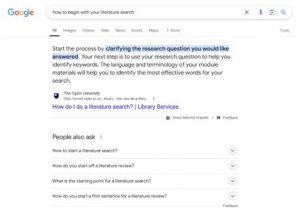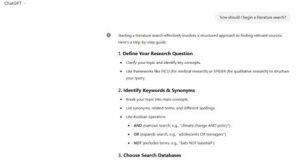To get started with your literature search, we recommend Swisscovery RZS – HSLU or Google Scholar (in addition to already known texts or authors). Sometimes, however, simple internet searches can also help you to familiarize yourself with your topic. While not being the ideal tool to find the right literature, search engines can be helpful to outline your topic and see how it is spread on the net.
Commercial Search Engines
Search engines such as Google, Bing, DuckDuckCo, Ecosia & Co are particularly suitable if you want to get an overview of a topic.
- You will gain an insight into the current reporting on the topic in mass media (e.g. „News section“ on Google). For a more in-depth analysis of reporting in the daily press, it is best to use newspaper portals. The following are licensed by the HSLU: Electronic Media – HSLU
- Search engines offer an initial insight into which questions could be relevant to your topic.
- The output may also help you to find other relevant search terms for your literature search.
- You may also come across websites of government institutions and statistical offices that provide official data.
However, it should be noted that
- As these are commercial search engines, you will often be directed to the websites of associations or service providers. The information published there should always be viewed against the background of what the respective association is working towards or what service the service provider offers.
- With so many sources, you will probably only view the first 2-3 pages. Keep in mind that the ranking of the results in a search engine is often not transparent and top positions can be bought by the respective providers.
- Google Scholar is a different service to Google, which you can use to search for academic literature. You can find more information about searching with Google Scholar here.
More than just providing links to websites, search engines such as Google also provide answers to simple questions. However, check the sources given by the search engine and critically review the answers.
Example:
AI tools such as ChatGPT or Microsoft Copilot can be used to answer more complex questions. You can find more information on how to use these tools here.
Wikipedia
Wikipedia entries are often displayed as search results on the first page of an Internet search. Wikipedia is a good place to read up on a specific topic. Links to further keywords in the Wikipedia articles make it easy to delve deeper into the subject area.
In principle, anyone can become an author on Wikipedia. This means that the authors of Wikipedia articles do not necessarily have a professional background in the subjects they are writing on. This is one of the reasons why many supervisors of academic papers do not like to see Wikipedia as a source citation.
However, the references listed at the end of a Wikipedia entry might, after checking the source, be used for your academic work, or they might be suitable as a starting point for a literature search (see Snowballing).
Despite displaying problems in terms of the balance of authorships and thus the diversity of topics or the omission of controversial aspects of certain topics, Wikipedia articles can be critically reviewed by consulting the page impressions, revisions to the articles, and the discussion history.
The Wikibu (german) site checks Wikipedia articles according to statistical characteristics and then issues a „quality score“. However, as this score does not give any indication of the truthfulness of the content, the statements made in the articles should always be critically reviewed by the reader.
Further Information
Tips & tricks for Google searches (in German): DIE 16 BESTEN TIPPS UND TRICKS FÜR GOOGLE | Google Suche für Profis – YouTube
Insights into Wikipedia’s authorship and relevance criteria (in German): Vertraust du Wikipedia? Edit-War Wikipedia, Wahrheit im Internet | Forward | Impact | SRF – YouTube


